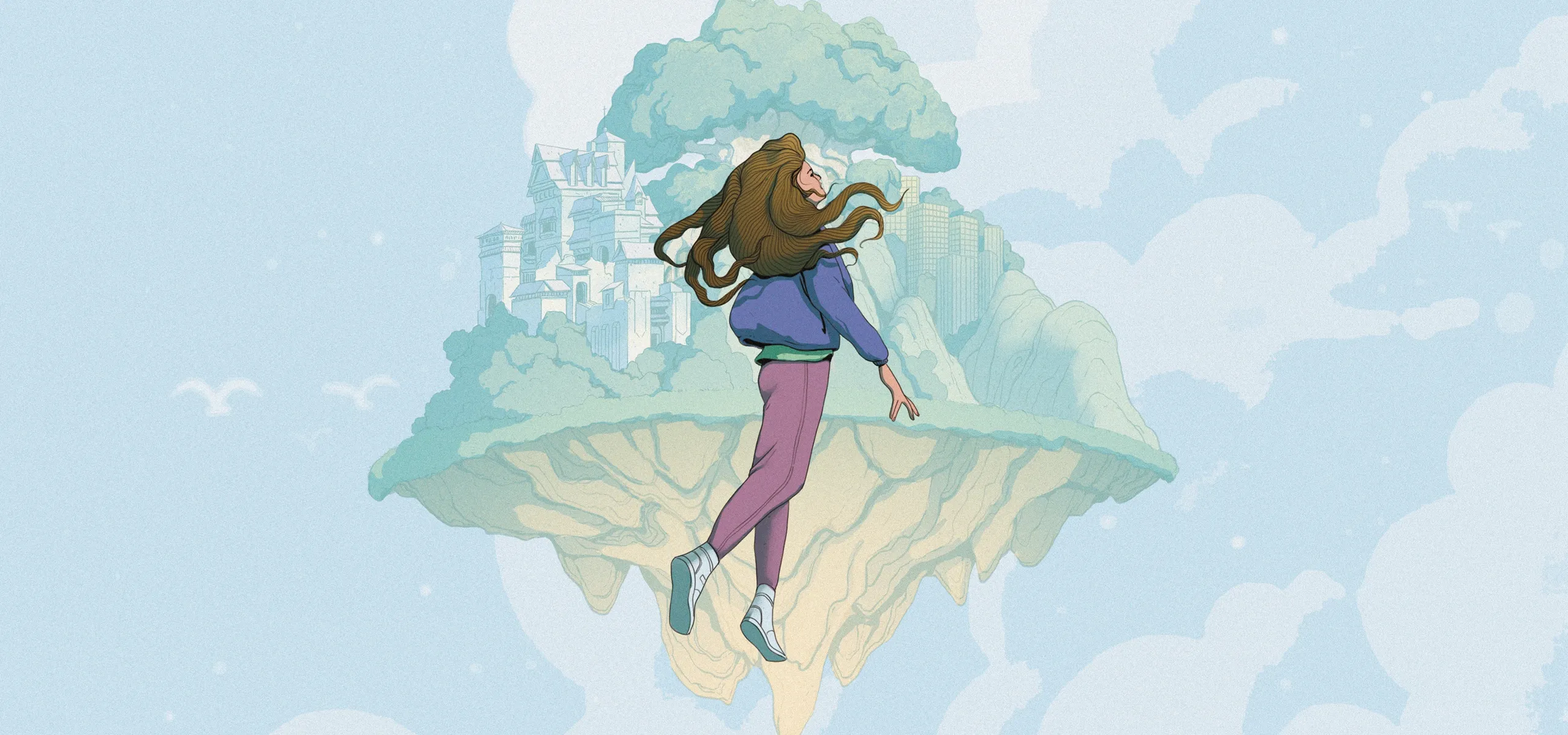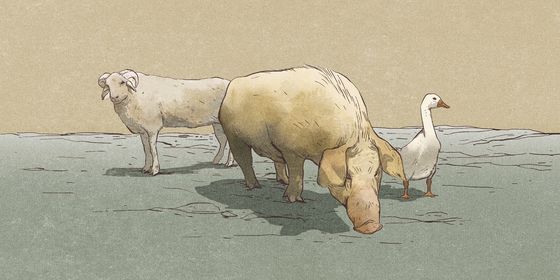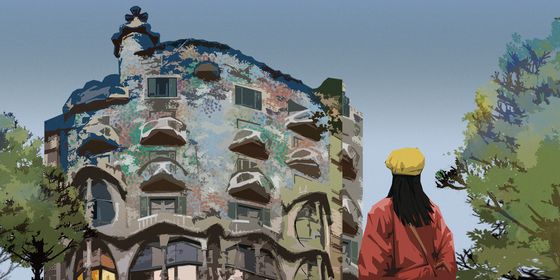Check out our new translated Chinese short story, by Hong Kong-based writer Cheng Jiaoyang
1
Who knew such a place could exist in Hong Kong?
Mia had never heard of Weightless Island until one day she was scrolling through Facebook and saw a post by Alice, an acquaintance from college:
“Flowers singing, the grass dancing, trees walking in handstands, animals floating in air and sipping on raindrops. Once I entered Weightless Island, I became weightless and flew up light as a feather. Within one week of being there, I was only fed by sunshine and rainwater but still felt energetic every day.”
What the hell? Mia felt puzzled, but still threw in a “like” for Alice.
Soon after, Mia saw other friends sharing similar posts about Weightless Island:
“OMG I am so obsessed with Weightless Island! No need to eat, walk, or make money, no need to pay 10,000 a month in rent! What a weightless life!”
“I am thinking about moving to Weightless Island, I mean it. In comparison, the rest of Hong Kong is worse than hell to live in.”
“Protect Weightless Island, the last oasis in Hong Kong!”
Mia was a social media copywriter, so she was familiar with the tricks behind getting content to go viral. If those Weightless Island posts had been shared by KOLs always jumping on the latest trend, she would have called it a gimmick. But all of these posts were from Mia’s old primary school or high school friends, or the children of her mother’s colleagues. All of them were poor, living in tiny public housing flats, and doing shitty jobs after graduation from community colleges—in other words, losers. And no company would spend money on hiring losers to do a marketing campaign.
Maybe Weightless Island does exist, Mia thought. What else could explain why her Facebook friends suddenly began talking about it? To dig up some more information, she got in touch with Nan, who was one of those Weightless Island fans (and also, as it happened, her high school sweetheart), and asked him out.
“How are you?” Mia broke the ice first.
“Not bad. You?” Nan replied, and smiled.
“Not bad.” Mia smiled back.
At this moment, they were standing on two sides of the exit gate in the subway station, Mia on the outside and Nan inside. A stainless steel fence separated them. Beside them, there were several other pairs of hands gripping the fence, belonging to other people who were standing there to chitchat, exchange packages, or have a brief rendezvous across that fence without having to walk through the gate and pay for a ticket.
“Is Weightless Island real?” Mia asked, deciding not to waste time on pleasantries.
“I’ve never lied in my life. You know that.” Nan fished out a photo from his pocket and handed it to Mia for her to check.
In the picture, heaven and earth were blending together, only the sea was shining and blue. There were flowers and trees flying above the sea, and a castle-like hut hanging in the air. There were shiba inu dogs, house cats, rabbits, and hamsters frolicking around the castle.
“That’s me.” Nan pointed at the man in the photo, who was floating upside down next to a shiba inu.
“Did you go there with your friends?”
“No, I went alone.”
“Who took this photo for you?”
“A local resident there.”
Mia was staring at the photo and drinking in every detail, while Nan kept murmuring:
“This place seems too fantastic to be real, but it does exist. When I was floating in the air, my body could change direction at will, to sleep on the surface of the sea, or dance among the trees. On that island, I forgot all the problems in my life. My brain was suddenly empty, but my heart was full of passion. I felt like I’d become the wind, free and happy, as if I were the main character of a fairy tale…”
“Then why did you come back?” Mia interrupted.
Nan sighed and said: “I have a son. If I leave, who’s going to take care of him?”
Mia didn’t answer this question, and just stared at Nan’s slim jawline. In that instant, a heartbreaking memory of herself and Nan from years ago came to her. They had hidden in a corner of the school’s storeroom to read forbidden magazines, smoke cigarettes, and drink beer, just the two of them. What did they talk about? She couldn’t recall; she only remembered that she lay in his arms, listened to him reading love poems, and let her forehead kiss his jaw. Although everything about Weightless Island sounded absurd, Mia was sure that her first love would never lie to her.
“So, how can I get there?” Mia finally asked this question.
Nan put away the photo, looked around, bowed his head slightly until his goatee touched Mia’s forehead, and whispered to her: “Fly.”
“What?”
“Yes, you go to the Central Pier, between Pier 5 and 6 you’ll see a short granny wearing a red nose like a clown, and she’ll take you to fly to Weightless Island. She’s the one who took my photo, by the way.”
2
At 7:30, Mia finished her work hastily and turned down her colleague’s dinner invitation, followed the people flocking into the MTR after working hours, and squeezed with other tired bodies into a carriage. She stared at the electronic map mounted above the window, waiting for the station names to be lit up one by one, from the eastern terminus of the line to the far west, Central Station. Mia got off the MTR there and took the elevator to the ground floor.
Nighttime in Central was bright as the day, a kaleidoscope of shiny lights. It was so bright that the gloominess of passersby had nowhere to hide. But Mia didn’t want to hide. Mia seemed determined. Without looking around, she walked directly onto the footbridge leading to the Central Ferries Piers: straight, left, straight ahead, then hurried down the stairs.
Under the bridge were the piers. Pier 1, Pier 2... Mia walked past without even seeing them. Finally, there was the yellow plaques with her destination, Pier 5, written in white. Mia’s eyes lit up. She quickened her step and found her way between Pier 5 and 6.
In that instant, Mia froze.
There was nothing. No red-nosed granny, no Weightless Island. Only several people sitting and standing around, waiting for the next ferry.
She felt like a fool.
—
Mia walked back the way she came, entered the MTR, packed into the crowded carriage, changed four subway lines while finishing a few saved drafts of posts on her mobile phone. She rode from the southwesternmost part to the northeasternmost corner of Hong Kong, got off, took a minibus for three more stops, then walked home.
She ran into several neighbors, friends of her mother’s, as she entered Happy Garden, the public housing estate where she’d lived for over 20 years. They seemed to want to tell her something but were hesitant to do so. Mia felt uneasy until she reached Tower 23, her own building. The security guard, Uncle Ma, yanked open the glass door and shouted at her:
“Go home quickly! Your brother is drunk as hell again!”
As she stepped out of the elevator, Mia saw her big brother lying in the hallway struggling like a fish fighting for its life on a chopping board. He was cursing, surrounded by the stench of alcohol. Beside her brother was Mia’s mother, leaning against the wall, prodding him with a cane to get him up. Mia hurried over to try to get her mom to go inside the house, but her mom refused.
“Why are you home so late? Help your brother first!” Mia’s mom pointed at the drunk body. “Hurry up!”
Mia tried hard to drag her brother up but failed—he weighed more than 180 pounds. She had no idea what to do but call Uncle Ma to come up and lend a hand. One hour later, they finally settled Mia’s brother down in the bedroom on the bottom bunk.
“Why didn’t you help?” Mia crabbed at her little sister, who was lying on the top bunk playing with her phone.
Without uttering a word, her little sister turned around, leaving Mia to stare at the back of her head with its short pink hair.
—
Late at night, Mia heard her brother snoring like thunder, and her mother sometimes moaning in pain. She felt the draft coming in through the window as she lay on the sofa bed in the living room but was unable to fall asleep. She picked up her phone from under her pillow and sent a message to Nan:
“I went to Central Pier today but didn’t see the granny with the red nose.”
The Facebook app showed that Nan was last online one hour ago. Maybe he’s asleep, Mia thought. She lowered her phone, looked at the ceiling, and imagined Weightless Island. What would it be like? She remembered that when she was a child, every time she came home from school and unloaded her heavy school bag, she felt a certain lightness. “Like I suddenly fly away,” she’d tell her mom. “Don’t be silly, humans don’t fly,” her mom would reply. She later learned that the feeling of flying was just an illusion created when a heavy burden is suddenly lifted from a body after a long time. Could Weightless Island be an illusion, created by people traveling to the Outlying Islands to temporarily forget about the stress of their lives?
Forget about it, Mia said to herself, don’t be delusional; there couldn’t be such a good place in this world. Besides, if a snail doesn’t have a shell, it won’t be able to live, right? People need a little pressure in order to survive, to work harder, make more money, get a better place to live, and become a better version of themselves.
Mia was falling asleep as she heard a ping on her phone. She opened her eyes and read Nan’s reply:
“That’s because you didn’t make a booking to Weightless Island in advance. No worries, I’ve called that granny and she’ll be waiting for you there tomorrow morning at nine o’clock.”
3
The next day, Mia woke up early. She sent the project she’d completed the previous night to her client, applied for sick leave through her company’s online system, and cooked three days’ worth of meals for her family to be kept in the refrigerator. After that, she started packing her bags.
Putting her office-lady outfits away, Mia stuffed sporty clothes and shoes into her backpack. She rummaged through the storage box: no need for her laptop, iPhone, or earphones…instead, she packed a sketchbook and a box of pencils that hadn’t been used for a while. I have to draw every view on Weightless Island, Mia told herself.
It was 8 a.m. on a workday in Hong Kong. The sky was clear and sunny, people walked in a hurry, and Mia was in a surprisingly good mood. She didn’t even feel guilty paying the exorbitant fee to grab a taxi on her way to Central.
Once she got out of the car, she saw a distinctive figure flitting between Piers 5 and 6. She was as short as a 6-year-old, with cropped gray hair, short arms and legs, wearing a red dress and red clown nose.
“Hi!” Mia waved her hands toward the granny.
“Mia?” The granny’s voice was clear and sounded like a child’s.
“Yes. My friend Nan told me to meet you here.”
The granny nodded, and fished out a transparent object from her bag: “Put it on.”
Mia took it and looked at it for a moment. It was like a pair of diving goggles, but a little bigger; the frame of the glasses was attached to a pair of headphones.
“What is this?” Mia asked.
“It’s for your flight later. Put it on to protect your eyes.”
Excited by the word “flight,” Mia put it on without a second thought. She was suddenly in the dark, like a blind person.
“Don’t be afraid, I am holding you.” Granny’s voice came out of the headset, and Mia felt her hands being grabbed. “You will be able to see soon, so just be patient.”
“Come on, step forward, yes, walk, walk, good, there is a small step in front of you, just lift your foot slightly, yes, that’s right, keep walking.”
In the darkness, Mia held onto the granny tightly with one hand and squeezed the shoulder strap of her backpack with the other. She was afraid her backpack would fall into the sea when she took off.
“We’re entering the flight path,” Granny announced.
As Mia heard this, she suddenly felt a strong sense of weightlessness, as if she was on a spaceship ride in an amusement park. She soared into the sky. Mia felt the wind on her face, the bright light searing her eyes. Suddenly, she dropped down sharply, rolled 360 degrees, and opened her eyes to a new world where everything was even more beautiful than she had imagined.
A clear blue sea was flashing the diamond-like sunlight, surrounded by all kinds of flowers and plants, which were murmuring to each other. Mia floated around the flowers and tried to touch them; they were warm and soft, like cuddly pets. A moment later, various animals popped up around her: they were swimming in backstrokes across the sky, leisurely and without a care. In the distance, there was a huge floating castle with iridescent walls.
Mia flew toward the castle’s gates, and they opened for her as if in welcome. Beautiful classical music was flowing out from the building. A group of dwarfs were playing instruments while flying around. They were all immersed in their music and ignored Mia. Yet in this paradise, she couldn’t stop thinking of the 300-square-foot cubicle where she lived, filled with old cheap furniture. Gloomy sadness was always on her mother’s face while coldness filled her brother’s and sister’s. What if she could bring her family to this beautiful castle and live without a care in the world?
Thinking about this, Mia began to worry that this paradise would become unaffordable if too many people discovered its secret and planned to move here. It probably will be bought up by the property developers and become a luxury destination, she thought.
I have to act as soon as possible! Mia told herself. But how to convince her family about this magical place? She had an idea.
“Granny?” Mia said to the air.
“I’m here.” Granny’s voice came over the headphones.
“Can you take a photo for me?”
“Of course!”
The invisible granny positioned Mia’s hands into a “V” sign and said: “Look happy, smile, OK—three, two, one, cheese!”
With a click of the shutter, Mia instantly lost the feeling of weightlessness and felt her feet firmly on the ground.
Immediately, she felt someone taking off the glasses and headphones: a light was on and the brightness stabbed Mia’s eyes. She heard applause and the chattering of people. Gradually, her sight adjusted, and she found herself in a small room, surrounded by several ladies smiling at her. Through a glass door, she saw people passing by, while others stopped to peer inside. On the wall of the room hung a sign: “New Pier Technology Workshop.”
“Congratulations, Mia! You are the 99th tourist to our virtual island! Here are your coupons.”
Two cards were shoved into Mia’s hands.
“This one-time experience costs only HK$9,999, and the photography service costs HK$1,000. But since you were recommended to us by Mr. Nan, we can give you a 20 percent discount!” One of the salesladies spoke to Mia politely.
Mia stared at the woman, unwilling to believe her ears.
“Are you saying that Weightless Island is fake?” Mia asked.
“No, no! It's not fake. It’s a virtual island in the metaverse. Users can be connected to it using our latest VR headsets and glasses, which is able to give you an immersive, 360-degree weightless sensation. We are so thrilled to officially launch it at the end of this month. And we believe it will become a virtual journey anyone in Hong Kong can take to relax after work, anytime.”
The saleslady paused a moment, and waited for Mia’s response. Undeterred by Mia’s silence, she continued her speech with a bright, robotic smile.
“Miss Mia, could you please post a review about your Weightless Island experience on social media? If you do, we can give you a bigger discount.” She tapped on her calculator and showed a new number to Mia.
Mia seemed to have lost the ability to communicate. Her face was pale, as though she’d just finished an exhausting marathon.
“Does Nan work for your company?” Mia asked.
“Certainly not. Mr. Nan is a VIP member of our peer program.”
“Peer program?”
“Yes. This is an exclusive group. Would you like to join? If you successfully invite a friend to participate in a blind trial of our experiences, you will get a 10 percent commission! The more friends you attract, the more you earn. If you are interested, let me show you more information…”
The saleslady kept talking but Mia felt too dizzy to focus. She saw more and more passersby gazing at her through the glass door, as if they were watching a clumsy animal doing tricks in a cage. She was burning with shame. She could do nothing but grip the shoulder strap of her backpack, filled with her sporty clothes, sketchbook, a box of pencils, and a string of daydreams that she never wanted to speak of again.












